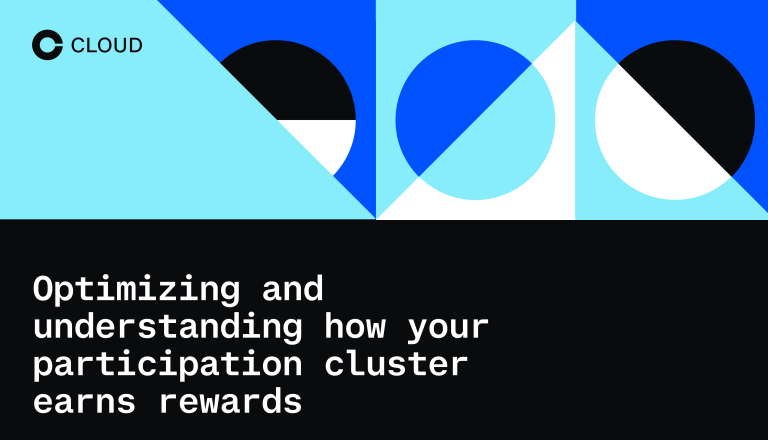Optimize your participation with Coinbase Cloud infrastructure
January 26, 2022
Allowing other token holders to join your node cluster lets you earn increased rewards from the tokens staked

As a token holder, you probably want to play an active part in securing the protocols you support, which allow information to be shared securely and reliably across the network. But running the nodes that communicate across blockchain networks is difficult to do yourself.
Coinbase Cloud lets you run your own “participation cluster” — a dedicated node and supporting infrastructure that validates staked participation across many proof of stake networks — without technical knowledge or in-house engineers. In exchange for helping secure the network, you earn rewards on tokens staked to your node cluster.
Earning rewards from your dedicated cluster
You can earn these rewards in two ways: directly from your own “self-bonded” tokens staked to the node cluster, or indirectly from your community’s stake “delegated” to it (when others are allowed to add their stakes).
All rewards, both self-bonded and delegated, will be determined by your protocol’s reward rate. Once they are calculated, Coinbase Cloud will deduct a participatory fee invoiced to you for your validator (or, for delegators, validator service fees are distributed to Cloud at the protocol level). Rewards from delegated stakes are based on the validator fee that you charge others for joining your node cluster (see “Setting a validator fee for your delegators” below for more information).
For most protocols, reward calculations and distributions are hardcoded into the blockchain, so Coinbase Cloud cannot control or guarantee earnings.
Here’s how it works:

Run your own staking as a service business
If you have a strong community of crypto enthusiasts, you don't have to be technical to run a staking as a service (StaaS) business.
First, invite your community to delegate tokens to your node cluster.
Our enterprise-grade platform will then manage and monitor your cluster, so you can be confident that it is reliable.
Your delegators can now participate in securing the network and earn rewards without running their own participation clusters. As a node operator, you set a “node operator” fee to earn rewards on the delegated tokens, which is sent to you directly by the protocol.
Setting a validator fee
You’ll want to attract delegators by setting a fee that is competitive with other validators in the network.
When you use Coinbase Cloud to manage your cluster, your total rewards will be reduced by the validator fee applied to rewards earned by your delegators. Your validator fee equals your node operator fee plus a small participatory fee applied by Coinbase Cloud to all rewards earned by your delegators, part of your invoiced service.
Your delegators can see the validator fee in the network validator list, but not your node operator fee. Here’s how to set a fee attractive to your delegators and calculate your node operator fee:

Earning rewards by delegating to Coinbase Cloud’s public validators
If you don’t have enough tokens to run your own participation cluster, you can delegate your stake to Coinbase Cloud’s enterprise-grade non-custodial public validators by following our delegation guides.
Coinbase Cloud adds a service fee to all rewards earned on the validator. Here’s how this works:

Check out our Coinbase Cloud public validator delegation guides.
If you run your own participation cluster, it will be subject to the Coinbase Cloud Master Service Agreement.